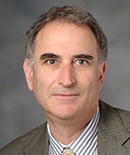- The Heart of the Matter: Finding Meaning in Medicine and Discovering How Compassionate Doctors Can Save Lives (SM742)
- 1:10-4:10 p.m. Tuesday
- Room 159
Physicians are expected to improve or save the lives of their patients, yet a growing number of physicians are struggling to enhance their own lives. It is estimated that 400 U.S. physicians a year commit suicide and thousands of others struggle with burnout. An interactive Tuesday workshop aims to address these issues and provide tools for resilience at work.
“This session addresses the importance of enhancing the physician’s self-care to improve patient care and safety,” said session moderator Kenneth J. Sapire, M.D. “There is a tremendous amount of burnout among practicing anesthesiologists. Burnout features emotional exhaustion, depersonalization and a low sense of personal accomplishment at work.”

Kenneth J. Sapire, M.D.
Dr. Sapire, a Professor of Anesthesiology and Perioperative Medicine at the University of Texas MD Anderson Cancer Center, and two experienced anesthesiologists will address these issues. Session attendees will discover applicable tools for enhancing the quality of their daily lives. Presentations will begin with better understanding the role of the brain, provide a narrative story of medicine and conclude with the role of positive psychology in improving lives.
The session will include a brief, didactic introduction. Attendees will then break into small groups to participate in activities for a more personal experience.
“We want more connectiveness among people so we can look each other in the eye and tell our own stories,” Dr. Sapire said. “We can make medicine more meaningful based on our own insights, then share these stories within our small groups on a personal level.
“People are eager to talk to one another and to reflect on their experiences. These are not things that come out of grand rounds at a hospital in that they are often personal stories. We fear we may not be allowed to be too open because we are doctors with our white coats and masks. This is a way for us to engage with one another nonjudgmentally in a safe environment. We can be authentic and begin healing in a supportive community.”
The presentation on the brain will focus on, among other things, the role of emotions in response to difficult situations. The narrative of medicine section will examine how to bring humanity and meaning back into medical practice. The discussion on positive psychology will highlight the tools available to physicians to improve their lives and the lives of their patients, Dr. Sapire said.
“We will look at how to get out of our electronic medical records and start connecting with our patients again,” he said. “This seminar is a pathway to restore resilience and make the practice of medicine safer. Rather than functioning as technicians, we can choose to connect with our patients as both people and as healers. By choosing to personalize our relationships, both the patient and the doctor can heal in this current medical environment.”
Return to Archive Index
